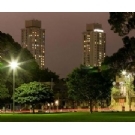
by Brianna Crandall — May 6, 2011—Field trials in three influential cities across the globe—New York, Sydney and Toronto—are affirming the superior energy performance of LEDs in comparison to traditional lighting products, according to the Climate Group.
The New York Department of Transportation (DOT) began LED trials in New York City’s historic Central Park in October 2009. The Climate Group’s analysis of DOT’s monthly data shows that among the five LED products tested, several showed excellent performance, very little light loss, and negligible color degradation. Economic payback is expected in four to six years, and the public appears to like the new lights. DOT staff members are now preparing to replace all 1,400 heritage lamps in the Park under a grant.
The City of Sydney, Australia has experienced similar success. After four LED trials of its own, Sydney joined The Climate Group’s LED program and began a second round of trials in 2010—this time using the LightSavers monitoring protocol, testing smart controls, and including a public opinion survey. Compelling performance results and positive public opinion results now see the City ready to replace all of its 8,559 street and park lights with LEDs. Winning bidders will be expected to deliver the City a minimum of 40 percent savings and greenhouse gas reductions. Various financing options are being explored.
The City of Toronto, Canada tested LED luminaires in its housing residence garages. T8 lamps were tested alongside the LED products, and both incorporated controls that increase light output when there is movement nearby, allowing the base light output to be set lower. These products operated 24/7 over 6,500 hours—the longest running among the LED trials. The study found no light loss and strong public acceptance of the LED color temperature and controls features, despite their higher cost. City groups are now preparing to replace the lighting in 30 garages and are creating a procurement consortium with local hospitals and other public agencies to further reduce price.
In summary, the Climate Group says that well-conceived trials across the world are decisively showing that this new technology performs well, meeting or exceeding the expectations of potential adopters. Perhaps even more importantly, public acceptance as measured by surveys, opinion polls and increased park use at night has also built political support in these three cities.





